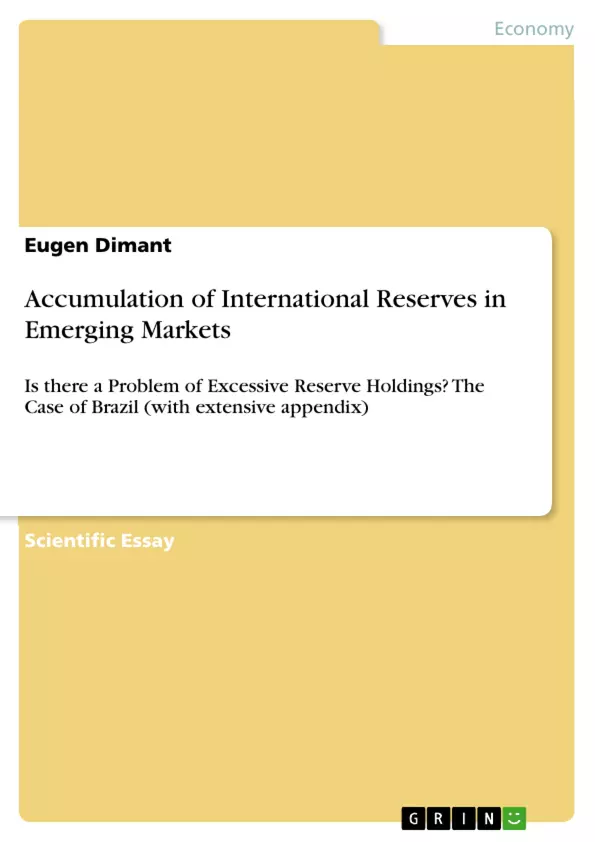In the aftermath of various crises such as the Asian financial crisis at the end of the nineties, which had a huge impact on the national and globalized political economies worldwide, a process of massive reserve accumulation started, especially in East Asia [Bar-Ilan/Marion 2009: 802]. This process of reserve accumulation initiated a rapid change of the world’s pattern causing changing demands that need to be handled since the beginning of the new century.
The so called globalized world realized that not only the power they were given to affect own policies and long term contingency approaches should be taken into account, but also they had to admit that intergovernmental interaction needs to play a decisive role in every deliberation of political and financial activity. Having the present economic situation in mind, almost every day new banks and financial institutions are collapsing while driving down the world further in a downward spiral. Obviously, the confidence and reliance on the conceptual skills concerning financial matters is suffering tremendously ever since these crises and need to be reestablished contemporarily in order to stimulate the indispensable demand for goods and services.
Since 1997, the emerging markets have boosted their international reserve holdings by 60% [Walters/Cruz 2008: 665] and even the developing nations increased their foreign exchange reserves from around 8% in the 80s to almost 30% of GDP in 2004 [Rodrik 2006: 4]. Therefore, this paper will have a closer look on what the immanent theoretical justifications declare from the economical point of view and clarify what effects this process has especially on the Brazilian economy. The reason for having this discussion is the fact that “reserve inadequacy could affect individual countries differently” and thereby each country “opted to hold more reserves than others and it seemed only natural to ask at what point reserves became inadequate; or indeed excessive” [Bird/Rajan 2003: 873]. Consecutively the different reason and goals for performing reserve accumulation will be discussed in an idiosyncratic sense.
Inhaltsverzeichnis (Table of Contents)
- 1 A Macroeconomic Perspective on Reserve Accumulation
- 2 The Motives
- 3 Economic Implications and Evidence
- 4 The Case of Brazil
- 5 Conclusion
- 6 References
- 7 Appendix
Zielsetzung und Themenschwerpunkte (Objectives and Key Themes)
This paper examines the phenomenon of international reserve accumulation in emerging markets, particularly focusing on Brazil. It aims to analyze the motivations behind this trend, explore the economic implications, and assess whether excessive reserve holdings pose a problem.
- The role of international reserves in providing self-insurance for emerging markets.
- The use of reserve accumulation as a tool for achieving competitive advantage through undervalued exchange rates and capital controls.
- The potential economic implications of excessive reserve holdings.
- The specific case of Brazil and its experience with reserve accumulation.
- The relationship between reserve accumulation and economic growth in emerging markets.
Zusammenfassung der Kapitel (Chapter Summaries)
- 1 A Macroeconomic Perspective on Reserve Accumulation: This chapter introduces the concept of reserve accumulation, highlighting its significance in the aftermath of global financial crises. It explores the factors driving this trend and the need for international cooperation to manage its consequences.
- 2 The Motives: This chapter delves into the theoretical justifications behind reserve accumulation, examining three key motives: the precautionary motive, the mercantilist model, and the need for self-insurance against economic shocks.
Schlüsselwörter (Keywords)
International reserves, emerging markets, Brazil, financial crises, self-insurance, precautionary motive, mercantilist model, exchange rate, capital controls, economic growth, economic implications.
Frequently Asked Questions
Why do emerging markets accumulate international reserves?
Key motives include precautionary self-insurance against financial crises, mercantilist goals for competitive advantage, and managing exchange rate stability.
How did the Asian financial crisis influence this trend?
The 1997 crisis highlighted the vulnerability of nations with low reserves, leading East Asian and other emerging markets to boost their holdings significantly.
What is the "mercantilist model" of reserve accumulation?
It refers to the practice of keeping exchange rates undervalued through reserve building to stimulate exports and economic growth.
Can reserve holdings become excessive?
Yes, the paper discusses at what point reserves transition from being a necessary safety net to being potentially excessive and economically inefficient.
What is specific about Brazil's case in reserve accumulation?
The study explores how Brazil utilized reserve accumulation to stabilize its economy and the idiosyncratic effects this process had on its GDP and financial activity.
- Arbeit zitieren
- Eugen Dimant (Autor:in), 2010, Accumulation of International Reserves in Emerging Markets, München, GRIN Verlag, https://www.hausarbeiten.de/document/165861


